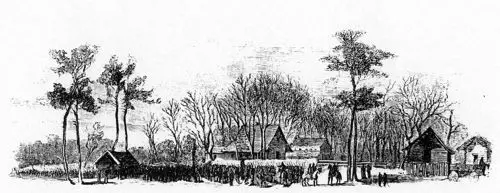Moses Barber had simply had enough of his cattle going missing. He believed that David Mizell and his friends were periodically stealing from his herd. His rage reached a point where Barber publically declared that if David Mizell set foot on his property again, he would be shot.
On February 21, 1870, David Mizell became the first casualty of the Barber-Mizell Family Feud. He was shot and killed on Barber property near Holopaw, Florida, in Osceola County.
Moses Barber first settled in North Florida in the 1830s. As the Seminoles were pushed to the south, Barber expanded his cattle operation into Central Florida. Some members of the Barber family built homes on the south end of the cattle run, near Fort Christmas. By the time the Civil War began in 1860, Moses Barber was a prominent and successful cattleman.
During the Civil War, Florida was the primary supplier of beef to the Confederate Army, and the Barber family had one of the largest cattle businesses in the state. Once the war was over, some of Barber’s fellow cowmen were taking part in the Reconstruction government, which he saw as a betrayal.
David Mizell, who had fought for the Confederate Army, was named sheriff and tax collector of Orange County after the war. Moses Barber refused to pay what he believed were unfair taxes to the U.S. government. Mizell responded by taking some of Barber’s cattle to compensate for the unpaid debt. Tensions between the Barber family and the Mizell family escalated during the late 1860s, with other cattle families taking one side of the argument or the other.
Moses Barber believed that Mizell family friend George Bass had stolen some of his cattle, and confronted him about it. The Mizells controlled the sheriff’s office and the courts, so Barber and members of his family were charged with “false imprisonment” for holding Bass against his will. After decades of lawlessness on Florida’s frontier, Mizells charged Barbers with a series of crimes including arson, polygamy, and tax evasion. At the heart of the dispute was control over Florida’s cattle industry.
David Mizell ignored Moses Barber’s warning to stay off his land. Mizell, his son Will, and his brother Morgan ventured onto Barber property. As they crossed Bull Creek on their horses, shots were fired from behind some bushes, and David Mizell was killed.
As he lay dying, David Mizell asked that his death not be avenged. His brother John had other plans.
John Randolf Mizell, David’s brother, was the first judge of Orange County. Despite his position, Judge Mizell wanted swift justice for the men he was convinced were behind his brother’s death. Within weeks, Moses Barber’s son Isaac was shot and killed, allegedly while trying to escape arrest and Moses Jr. was drowned by vigilantes. Barber family friends William Yates and Lyell Padgett were shot and killed as fleeing suspects.
William Bronson, a family friend of the Mizells, was reportedly shot by Burrell Yates, a friend and relative of the Barbers. Allegedly, Yates was trying to prevent Bronson from burning evidence that would incriminate the Mizells and their associates in the wrongful deaths of the Barbers.
According to Barber family history, a total of thirteen Barber men were killed by the Mizell family during the Barber-Mizell Family Feud of 1870, but this claim can not be verified by public records.
No one is sure what happened to Moses Barber during and after the feud. Some records indicate that he died in 1870, while others have him alive and living in Texas in 1877.
Remnants of this colorful chapter of Florida history remain today. The Mizell family homestead is located in what is now Harry P. Leu Botanical Garden in Winter Park. The oldest grave in the small family cemetery there belongs to David Mizell. The Yates family homestead, originally located on Taylor Creek, has been relocated to Fort Christmas Historic Park. Needham Yates and William Yates were both killed in the Barber-Mizell Family Feud. The rural Volusia County town of Barberville was founded by James D. Barber, a descendent of Moses Barber.
Today, the Barber and Mizell families have merged through marriage. Several generations have blood from both sides of this bitter dispute.
For more information on the Barber-Mizell Family Feud of 1870, read the historical novel Florida’s Frontier: The Way Hit Wuz by Mary Ida Bass Barber Shearhart.
Dr. Ben Brotemarkle is producer and host of “Florida Frontiers: The Weekly Radio Magazine of the Florida Historical Society.” The show can also be heard online at myfloridahistory.org.
